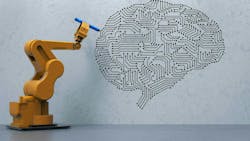The buzz around the industrial metaverse and circular economy concepts was strong at Hannover Messe this year. But when I reflected on my visit to Germany’s leading industrial technology trade exhibition, one topic stood out as worthy of further contemplation: the notion of “people-centric manufacturing.”
Nearly all vendors, system integrators, and consultants in Hannover made a point of mentioning how wildly people-centric they are. In this vein, the European Commission’s new “Industry 5.0” approach promises substantial new benefits for industry, workers and society as a whole.
Some in Hannover were even heard to say, “Let’s make manufacturing people-centric again.”
But what does this really mean? Did manufacturers suddenly lose their focus on people and are now trying to regain it?
Twenty-five years ago, I started my career as a project manager at a Tier 1 automotive supplier that had around 800 employees. The factory had a safety and zero-waste culture in place, as well as work standards and a continuous improvement approach. Production was automated or semi-automated. Operators performed assembly tasks or ran machines. We had a training program. Both blue- and white-collar workers were at the center of the operation.
What has changed? Well, the rapid progress of technology — the convergence of advanced automation and the data-driven nature of almost every aspect of work — has been a real game-changer. It is easy to understand how some might feel lost or threatened in the current environment of immersive digital twins, AI and the threat of cybersecurity breaches.
The impact of technology differs, of course, according to region, company, industry and level of automation. There are differences between asset-intensive plants like steel mills and EV battery manufacturing plants that are less than a decade old.
However, it’s been clear for a long time that requiring humans to perform repetitive tasks on the assembly line — especially when alternatives are available — is not very “people-centric.”
Has the use of digital tools made for more people-centric operations? Probably not. In some cases, these tools are even less people-centric than repetitive-task assembly lines. Some digital tools can put loads of stress on workers, such as when they relentlessly register every small deviation from a standard.
Does this mean the “people-centric” concept is merely a marketing ploy? Far from it.
Becoming a Real 'People-Centric' Technology Organization
Treating workers purely as production assets or calling them “full-time equivalents” doesn’t demonstrate sufficient respect for these critical creators of value.
As automation and digitalization, including AI-powered solutions, take over areas that were exclusively operated by humans for hundreds of years, it is important to continually upskill and reskill workers to ensure the human talent pool remains capable of doing the work that machines cannot. On the shop floor, reskilling is about being able to work with digital tools—including AI co-pilots (for generating and optimizing complex automation code to shorten simulation times), augmented reality and predictive maintenance tools—and to be able to work with data, including leveraging no-code tools.
Still, for the foreseeable future, people will continue to do repetitive work because of their flexibility and because human labor for some tasks is still cheaper than automation. This is where implementation of an enhanced safety culture, ergonomics and digital solutions like co-pilots and digital-based man-machine collaboration can demonstrate respect for the humans who build a company’s success.
The real-life evidence shows that companies that implement a sustainable, people-centric technology culture benefit from reduced employee churn and the retention of skilled workers — and are likely to see productivity gains as a result.
Building a sustainable people-centric culture isn’t a slogan. It’s about genuine respect, continuous development and leveraging technology like generative AI-powered co-pilots to improve working conditions.
Numerous outstanding examples already exist, one of which came from my conversation with a representative from a U.S.-based automotive supplier. This supplier is using generative AI technology for comprehensive knowledge management across the company—encompassing guidelines, product details and engineering insights. The implementation of this technology is expected to boost efficiency by 2-3% for its workforce of over 3,500 employees.
Another commendable approach that underscores a people-centric ethos is using generative AI for contextual translation of documents and work instructions to accommodate employees who are not native speakers. The CIO of a U.S. automotive supplier I spoke with said “rather than wait for manual translation of documents,” the company plans to “quickly begin translating all written material (such as working instructions) in advance of employee requests.” (Of course, before work instructions are made available to workers, the translations must be reviewed for accuracy by a human.)
Embracing a human-centric perspective amid the dominance of technology in a company’s processes may present challenges, yet it holds the key to unlocking competitive advantages.
Jan Burian is senior director, head of IDC Manufacturing Insights EMEA and leader of Europe: Future of Operations Practice.
About the Author

Jan Burian
Global Analyst
Jan Burian is a global analyst, author, and speaker. His expertise spans digital transformation, management, leadership, and the geopolitical influences shaping manufacturing and global supply chains. Jan led Manufacturing Insights Europe at IDC and held consulting positions at EY and Deloitte.
